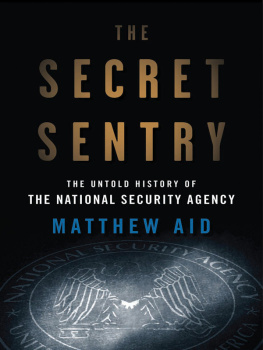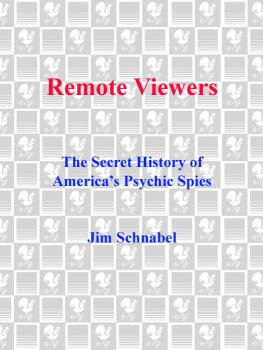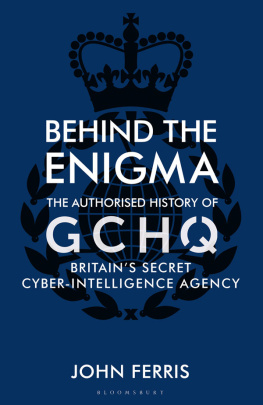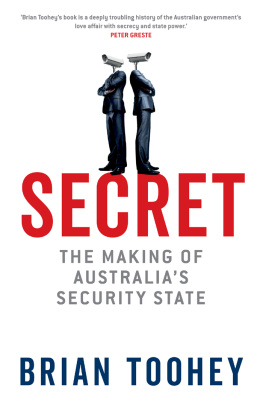The Secret Sentry
THE SECRET SENTRY
The Untold History of the
National Security Agency
MATTHEW M. AID

Copyright 2009 by Matthew M. Aid
All rights reserved. No part of this book may be used or reproduced in any manner whatsoever without written permission fromthe publisher except in the case of brief quotations embodied in critical articles or reviews. For information address BloomsburyPress, 175 Fifth Avenue, New York, NY 10010.
Published by Bloomsbury Press, New York
All papers used by Bloomsbury Press are natural, recyclable products made from wood grown in well-managed forests. The manufacturingprocesses conform to the environmental regulations of the country of origin.
LIBRARY OF CONGRESS CATALOGING-IN-PUBLICATION DATA
Aid, Matthew M., 1958
The secret sentry : the untold history of the
National Security Agency / Matthew M. Aid.
p. cm.
Includes bibliographical references and index.
eISBN: 978-1-60819-179-6
1. United States. National Security Agency History. 2. Intelligence service United States. 3. Electronic surveillanceUnitedStates. 4. United States History1945 I. Title. II. Title: Secret sentry, the untold history of the NSA. III. Title: Untoldhistory of the National Security Agency.
UB256.U6A53 2009
327. 1273dc22
2008037442
First U.S. Edition 2009
1 3 5 7 9 10 8 6 4 2
Typeset by Westchester Book Group
Printed in the United States of America by Quebecor World Fairfield
To Harry, Rita, and Jonathan Aid
My Family, My Best Friends, and My Staunchest Supporters
Gratis eternum
Know your enemy and know yourself, findnaught in fear for 100 battles.
Know yourself but not your enemy, find level ofloss and victory.
Know thy enemy but not yourself, wallow indefeat every time.
SUN TZU
There are no secrets except the secrets that keepthemselves.
GEORG BERNARD SHAW,
BACK TO METHUSELAH
Contents
Another mans soul is darkness. Does anybodyever really know anybody else?
RUSSIAN PROVERB
The consensus of historians (and the overwhelming burden of evidence) dates the initial stages of the Cold War to well beforethe end of World War II. The United States would emerge from the war as a superpower with arguably the worlds strongest armedforces, sole possession of the atomic bomb, a vastly expanded industrial base, and an infrastructure untouched by the ravagesof war. But on the negative side, the country had at best a rocky relationship with one of its war time allies, the SovietUnion. By the time Nazi Germany and Japan had surrendered, Russia was on a collision course with both the United States andBritain. It was not long before the Soviet Union was regarded as the main enemy by the Western nations. Since it remaineda rigidly closed society under Joseph Stalins regime, the lack of transparency was a major factor driving the Cold War. Becausethe United States had only a very limited idea of what was going on in the Soviet Union, its satellite countries in EasternEu rope, and communist China, the emerging confrontation became all the more dangerous. But one of the most secret resourcesthat had greatly contributed to the victory of the Allied Powersthe United States and Britains ability to intercept andread the communications of our former enemies Germany, Japan, and Italy, both in the clear and encodedwould be quickly redirectedto the task of gathering communications intelligence about the new Sino-Soviet threat.
It is difficult to imagine, many decades later, just how mortal that threat was perceived to be, particularly after the SovietUnion detonated its first atomic device in the summer of 1949. The prospect of a nuclear Pearl Harbor meant that the UnitedStates would rely heavily on an increasingly large and expensive communications intelligence effort.
Carter Clarke Declares War on Russia
In a certain sense, Brigadier General Carter Clarke was the founding father of the National Security Agency (NSA). A blunt,often profane, hard-drinking, and demanding individual, Clarke lacked the polish of his fellow officers who had gone to WestPoint. He began his career as an enlisted man and worked his way up through the ranks. Despite a lack of previous intelligenceexperience and a file drawer full of bad fitness reports (Clarke was a real maverick), he was the man the U.S. Army selectedto run the analytic side of SIGINT Army G-2, the Special Branch. A college dropout (he joined the army and served under GeneralJohn Pershing chasing Pancho Villa in Mexico), he was a highly intelligent man and an autodidact.
Clarke was described by many who worked with him as being a tough, impatient, no-nonsense workaholic who abhorred conformityand was intolerant of bureaucracy. When things did not get done to his satisfaction, Clarkes volatile temperament usuallytook over. Former colleagues recall that his temper tantrums were legendary. A former army officer said, I knew that Clarkehad an explosive temper. Although quite a decent person, he laced his language with frequent bursts of profanity. His detractors,who were many, described him as loud, uncouth, brash, and argumentative, with a tendency toward overstatement when tryingto make a point or win an argument. And yet, despite his brashness, gruff talk, and stern demeanor, Clarke earned the respect(and fear) of virtually all the U.S. Army intelligence officials he dealt with. A former senior NSA official, Frank B. Rowlett,described Clarke as a very unconventional man and a man of considerable moral courage [who] would spit in your face and laughat you.
Clarkes Special Branch was a component of Army G-2 in the Pentagon created after Pearl Harbor, the unit to which all interceptswere sent for analysis and reporting to consumers. It only worked on SIGINT materials, while the rest of Army G-2 worked onmore mundane materials, like military attach reports. The armys SIGINT organization, the Signal Security Agency (SSA), commandedby Brigadier General W. Preston Corderman, was a separate field agency that was (until 1944) part of the Army Signal Corps.As noted above, all its intercept material went to Clarkes G-2 Special Branch.
When Clarke took command of the Special Branch of Army G-2 (intelligence) in May 1942, the United States was able to readthe top Japanese diplomatic and military encoded communications (which enabled U.S. forces to win the Battle of Midway in1942, the turning point of the war in the Pacific) and the British were reading the German codes generated by the Enigma machine.Despite his rough edges, Clarke worked well with his British counterparts in the Bletchley Park code-breaking center. Deepdown, however, he trusted no man and no nation. According to Rowlett, Clarke was a good man to have in the intelligence businessin our line of command [the communications intelligence, or COMINT, field] because he didnt trust any nation. He just said,Theyre your friends today and theyre your enemies tomorrow, and when theyre on your side find out as much as you can aboutthem because you cant when they become your enemy.
The United States was not only reading the codes of the three Axis Powers; it was reading the encrypted diplomatic and militarytraffic of more than forty other countriesincluding our allies and neutral states. Well before the end of the war, Clarke,like many in the American military and government, decided that the Soviet Union would become our next main enemy afterthe war, and he issued an order in January 1943 to begin cracking Russian codes. So secret and delicate was this operationthat very few people were allowed to even know it existed, and since virtually nothing was put in writing, the paper trailtoday is virtually non existent. The U.S. Navy had its own code-breaking operation headquartered in Washington. Though thetwo cryptanalytic organizations shared code-breaking responsibilities, cooperation was the exception rather than the rule.
Next page







